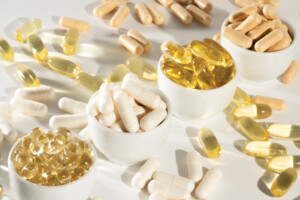Heightened awareness of skin care ingredients, coupled with skin issues erupting from pandemic stress, attracts cosmetic consumers to the natural segment.
Wow, your skin is glowing! is something we all want to hear. With awareness regarding nutritional requirements for beauty from the inside out, along with increasing consumer willingness to spend on health and beauty supplements, the market has been expanding.
Suhail Ishaq, president of California-based BioCell Technology, noted, “The skin is often called the mirror to a person’s health. Eating a balanced diet, staying active and taking quality vitamins and supplements is key to keeping the skin healthy and looking good as we age.”
Being the skin is the largest organ we have, “we must do all we can to protect and nourish it,” said Laurel Sterling, MA, RD, CD/N, nutritionist and educator with Illinois-based Carlson Laboratories. “Our skin is not only important as our first barrier of protection for our body, but it also has a very absorbent layer that absorbs approximately 60 percent of what we put on it. Therefore, nourishing properly it from within as well as topically is paramount.”
While hoping to maintain a good appearance, there’s a lot that can go wrong. Sterling said, “Many factors affect the integrity of our skin health like stress, inflammation, poor diet, UV rays, smoking and chemicals found in products that we use on our bodies. These all work together to damage the skin, and some chemicals even bioaccumulate in the body.
“Healthy skin is glowing, radiant, firm and supple,” she added. “When skin is dry, cracked, red and thin, it can indicate skin damage and potential health issues. Healthy skin color, tone and elasticity is what most people are striving for to keep premature aging at bay.”
Adam Goodman vice president of sales with Korea Ginseng Corp. (South Korea) and president of Natural Products Association, East, noted that for healthy skin, any number of factors can go into that determination. “Proper hydration is important,” he said. “Limiting exposure to and/or protecting from sun exposure is critical. Proper supplementation is also key. Antioxidant use, immune support, collagen, and good, foundational supplementation are all important for healthy skin from within.”
Growth of Beauty Supplement Sales
As reported at Businesswire.com, the global beauty supplement market is expected to exhibit a CAGR of 4.8 percent over the forecast period (2019–2027), owing to increasing awareness about health benefits of beauty supplements, coupled with increasing demand for organic and natural products.
“This market is an ever-growing segment,” said Sterling, “as most women, as well as men, want to defy premature aging and stay as young looking as they can for as long as they can. I believe now more than ever are becoming very aware and tuned into what they put in their bodies and on their skin. There is a heightened awareness of what ingredients are in beauty products and supplements, and people look for “clean products,” ethically produced, sustainably sourced, not tested on animals, Made in the USA, etc.
Morris Zelkha, CEO of Israel-based TriNutra, agreed that interest in cosmeceutical ingredients continues to rise both in the U.S. and globally.
“The year 2020 brought the pandemic, and with it came a lot of ‘maskne’ and stress breakouts. This has led many consumers to seek out remedies, which we will continue to see as we continue through 2021. Another aspect of skin health that may see increased sales is scalp care specifically and natural ingredients can do a lot to help in that area. For example, research into TriNutra’s B’utyQuin black seed oil showed it was able to effectively soothe the scalp and relieve redness, scaling and itch.”
Ishaq said, “One of the biggest trends right now is the tremendous growth of ‘beauty-from-within supplements.’ Consumer behavior has completely shifted during the pandemic. With spas and salons closed, consumers seek products that they can use at home, and the clinically proven ingredient BioCell Collagen is in the products they are buying.”
Essential Ingredients for Healthy Skin
For inside and out, there are important ingredients that help maintain healthy skin.
According to Sterling, certain nutrients, such as vitamins A, D, E, C and MSM (methylsulfonylmethne), are beneficial to the skin when taken as a supplement and used topically:
Antioxidants help protect the cells in your body from free radical damage. Free radicals can cause your cells to oxidize and as a result perform poorly. Thus, tissues can begin to degrade and increase skin damage. Vitamin A is an antioxidant that helps protect cells against damage by exposure to free radicals and encourages healthy skin cell production to rebuild tissue from scrapes, wounds and other tissue damage. Vitamin A also can act as a humectant, drawing water to the surface of the skin.
Vitamin C is an antioxidant, and it is needed to produce collagen and elastin. These are the connective tissues that give skin its elasticity. Vitamin C also helps repair and regenerate tissues and strengthens capillary walls.
Vitamin E is found in high amounts in the outer layer of the skin and plays an important role in antioxidant protection. One of its main functions in skin care is to protect against sun damage by absorbing the harmful UV light from the sun when applied to the skin, which can help prevent dark spots and wrinkles. Also, as a skin repairing antioxidant, vitamin E helps to reduce the appearance of new scars and recent stretchmarks.
Vitamin D3 is so important as cells with vitamin D3 receptors are found all throughout the body. Vitamin D is made when sunlight is absorbed by our skin, and then it is converted and transported throughout the body to help create healthy cells including the skin cells. It is difficult to synthesize adequate amounts of vitamin D from sunlight due to limited time out in the sun, sunscreens, latitude, time of year, color of skin and age; therefore, supplemental vitamin D internally or in a cream is as an excellent addition. Some studies have found that vitamin D can help with certain skin conditions like psoriasis or eczema.
MSM is well known as a key factor with its ability to support connective tissue, joints and skin health. MSM is a sulfur-rich nutrient, and sulfur plays an important role in maintaining connective tissue integrity. MSM lessens the breakdown of collagen and elastin, which results in damaged skin. It has shown benefits in improving skin hydration and tone, strengthening skin elasticity, reduce inflammation, enhancing the structural integrity of skin’s protective barrier, and reduce oxidative damage.
Avocado oil is not only beneficial for cooking with, it also can contribute to skin care and it is used in many creams and moisturizers. It contains vitamins A, D, E, fatty acids and other nutrients to aid in nourishing and moisturizing the skin. When applied topically, it can help to keep skin hydrated with no oily residue, and with its “anti-inflammatory effects, may contribute to reduction of redness with acne.” A 2011 review showed that “the vitamin E, beta carotene, vitamin D, lecithin, protein and fatty acids in the oil can support healing and soothe the skin,” and “One 2013 study found the essential fatty acids and oleic acid in avocado oil can promote collagen synthesis, which is the process of creating new connective tissue.”
Dr. Liki von Oppen-Bezalel, business development director with New York-based TriNutra added that ingredients with anti-inflammatory and antioxidant activity are essential for skin health. “Oxidative stress—and stress in general—and inflammation disrupt the skin structure and functions, leading to premature skin aging that could appear dry, flaky, red, irritated or with rash, wrinkled and unevenly pigmented (with pigmentation spots).”
She noted that ingredients that help boost the cell machinery, such as mitochondrial functions, are essential for the healthy state of cells, tissues and organs.
“B’utyQuin, TriNutra’s cosmetic ingredient, is a full spectrum, cold pressed and standardized black seed oil that provides all of these benefits,” she said. “Because of its standardization to 3 percent thymoquinone, it is one of the best ingredients to help boost mitochondrial functions that increase energy (ATP production), respiration and metabolism. Alongside that, B’utyQuin (and its dietary counterpart ThymoQuin) has an outstanding antioxidant capacity and efficiently supports a balanced inflammatory response, both of which contribute to better skin health and a healthier appearance both from the inside and out.”
Another popular boost for skin health is collagen, but certain types are more effective, Ishaq said. “BioCell Collagen is a branded ingredient composed of naturally occurring hydrolyzed collagen type II peptides, chondroitin sulfate, hyaluronic acid in a highly absorbable matrix.” According to clinical study data, daily supplementation with one gram of BioCell Collagen reduces facial lines, wrinkles, crow’s feet and dryness while improving skin elasticity, he pointed out.
What Skin Care Ingredients Should be Avoided?
While the focus is on what is best for great skin, manufacturers also gave their suggestions on what to avoid.
“Various substances used in skin care and beauty products are known to be endocrine disruptors (interfere with hormones), or ones that can be toxic to our nervous system,” said Sterling. “It is of utmost importance for us to use clean products. The FDA (U.S. Food and Drug Administration) says on their website ‘Under the law, cosmetic products and ingredients do not need FDA premarket approval, with the exception of color additives.’ Thus, it would be in our best interest to learn about the ingredients that are potentially harmful. Some specific things to look for products to be free from: parabens, phthalates, PABA, petroleum, artificial ingredients, colors and many more. Often certain ingredients are chosen because they are cheaper, but this is your health we are talking about here. Would you rather choose a product that costs less, but has several potentially harmful chemicals in it? I hope not.”
“It’s wise to avoid supplements that do not contain ingredients proven in clinical studies, especially collagen,” Ishaq added. “The collagen type, source, molecular size, composition and manufacturing process differentiate the various dietary supplement collagen products in their indications, efficacy, safety and tolerability.”
Multiple studies, including seven human clinical trials, support the safety, efficacy and bioavailability of BioCell Collagen. The ingredient can be found in NOW Foods BioCell Collagen and Solgar BioCell Collagen, Ishaq noted.
Do I Look Better?
Consumer demand, a competitive market and a changing cosmetic business makes product effectiveness so important. How does the consumer know what works?
“This is why extensive scientific research is so important because, through research, the benefits are substantiated and clear,” said von Oppen-Bezalel. “With our B’utyQuin ingredient, both the mechanism of action and the actual benefits are tested in in vitro, in vivo and with clinical studies that are published or communicated to finished product manufacturers and consumers via multiple channels. All of this to make sure the consumer is well educated about the product activity, safety and use. Then, fortunately, it is quite easy for the consumer to know that these products are working since the effects on skin health are VISIBLE. One sees the changes in appearance and texture of the skin. We saw this with B’utyQuin in its clinical study, where improvement in multiple parameters of aging skin were seen including hydration, luminosity, firmness and elasticity; and were evidenced with before and after images.”
Ishaq said consumers should look for products that say clinically proven. For example, consumers using supplement products containing 1,000 mg of BioCell Collagen per serving should see results in 12 weeks. Retailer Considerations
For beauty-from-within, retailer Thomas Donnelly, owner of Autumn Harvest Natural Market in Scotch Plains, NJ for 42 years, said he recommends alleviating chemicals from the diet, and getting nutrition from a variety of sources of food along with supplements. He also noted that collagen supplement sales have been strong.
For promotional advice, Ishaq said retailers should put beauty from within supplements on display and pair them with topical options. “They should also use their in-store and digital assets to inform consumers that they have solutions to maintain skin health,” he said.
Von Oppen-Bezalel added, “Retailers can promote healthy skin supplements as beauty from within products that help to support the body’s natural functions to keep the skin healthy, vibrant-looking, smooth and rejuvenated. Alternatively, one can perhaps speak more in detail about skin care at a cellular level by ‘revitalizing mitochondrial functions for skin rejuvenations.’”
But as with any products, promote them carefully, Goodman concluded. “Don’t over-promise and don’t make claims that aren’t allowed under FDA guidelines.” VR
For More Information:
Carlson, www.carlsonlabs.com
BioCell Technologies, www.biocelltechnology.com
Korea Ginseng Corporation, www.kgcus.com
TriNutra, www.trinutra.com





![[Extra! Extra!] Talking Heart Health With Carl Germano CNS, CDN](https://vitaminretailer.com/wp-content/uploads/2024/01/Heart-Health-300x200.jpg)






